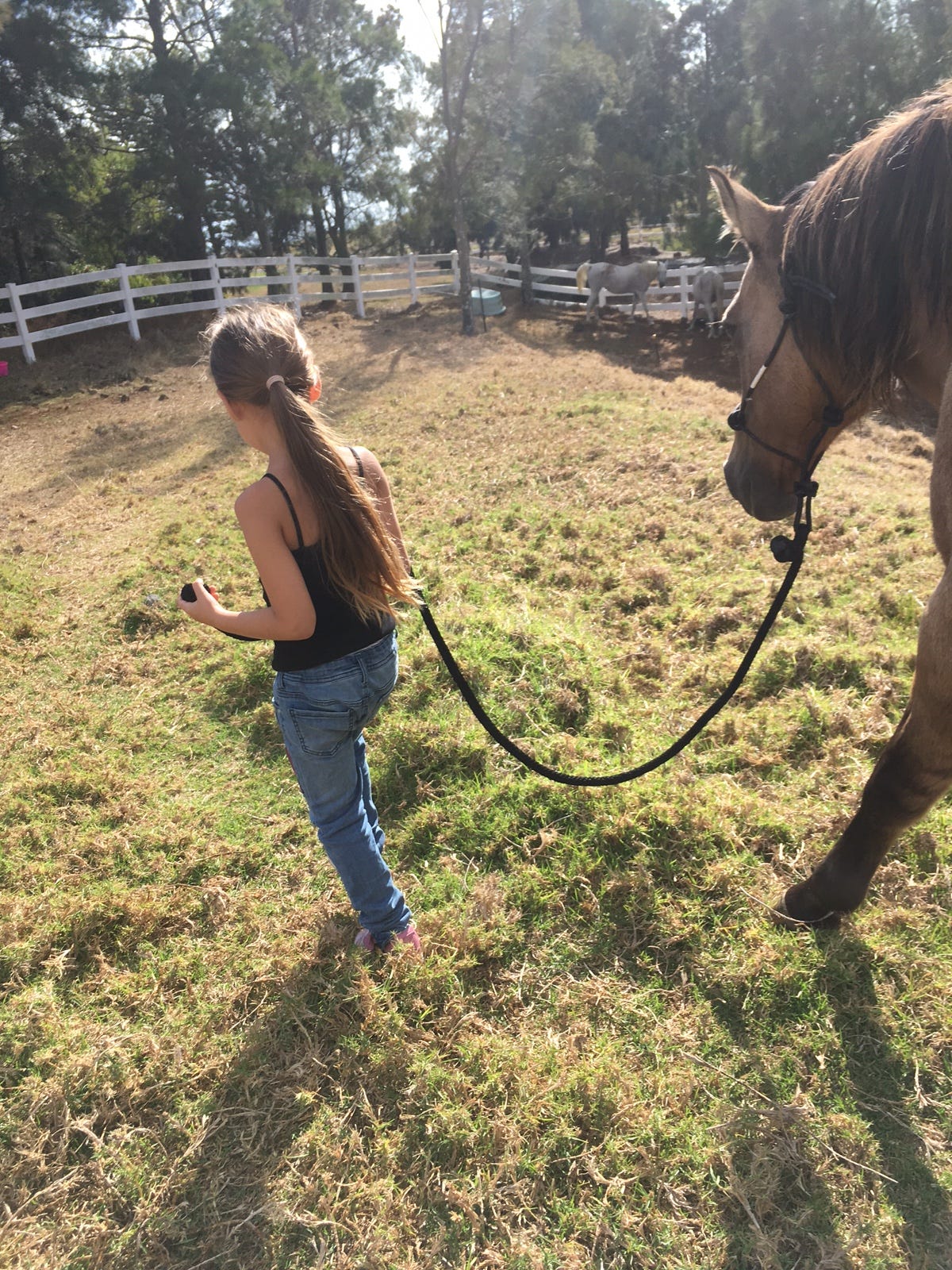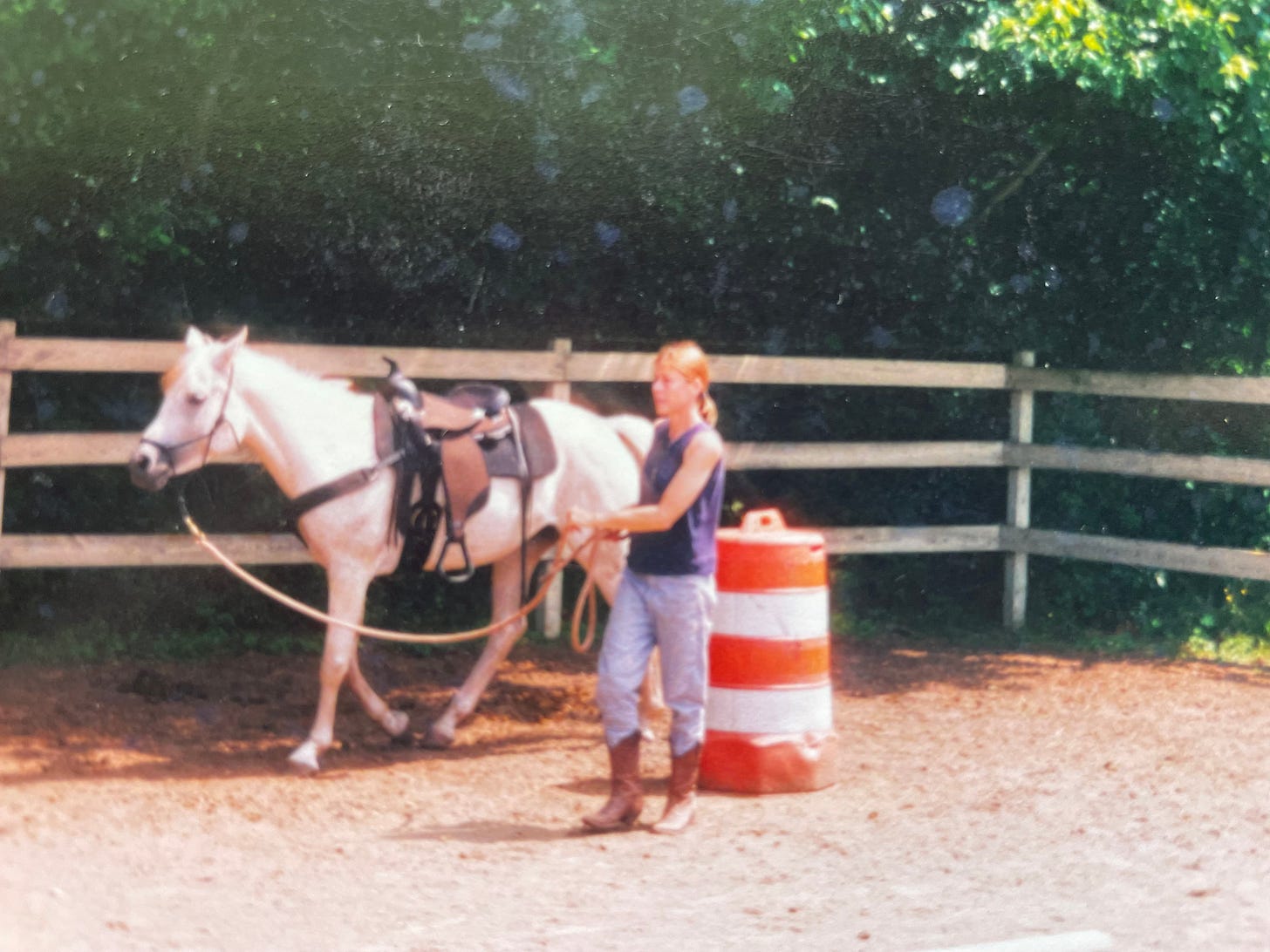Adding the word "Dignified" to "Beginner"
How I give myself permission to make mistakes, seek help, and learn
I have over 60 new subscribers in the past week, and would like to personally welcome each and every one of you if I could. I know 99% of you were at Matthew Ferraraʻs workshop, so you might want to start with last weekʻs essay on Barbie, Horses and Real Estate Commissions.
For the rest of us, I left off with my massive failure to be there for and with Zara, and her ability to forgive and move forward with our relationship. If only I could be as forgiving as my horses are with me. Mainly, I am unforgiving of myself. And that brings me to this weekʻs post.
If you found your way here via a share from someone else, or through social media, and are not yet receiving my weekly writing via email, feel free to enter your email address below to “subscribe” for free. There is also a paid option if you really like what you read…and I use that money to support other writers on Substack in a virtuous circle of paid subscriptions.
Were you ever in a workshop or meeting where you were given a prompt to share one of your earliest memories? Have you ever been asked about a moment when you felt ashamed? (Maybe the question “Are You Ashamed of Your Profession?” has uncanny relevance right now.)
Anyway, let me share. My early memory is of feeling ashamed.
When I was three years old, I was playing in a sandbox with one of two twin girls, while the other climbed to the top of the nearby slide. Meaning to warn the one about to slide, I called her name loudly - only to hear the twin digging next to me respond. I can still feel the blush of embarrassment hot on my cheeks as I type. I had made a mistake.
Weird for a kid to be so embarrassed about making mistakes. Kids are meant to be mistake-embracing, trial-and-error machines. Thatʻs how we learn everything we have to master with our bodies as new humans, from how to get and hold a parentʻs attention, to how to crawl, stand, walk and talk.
Kids are natural at learning by trial-and-error. Without making mistakes we cannot find our way to answers, especially with embodied learning.
As adults, we become more hesitant, obsessively aware of the gaze and judgments of others. Still, those of you who have been reading since the beginning of my memoir-writing may be surprised to hear me say it is not easy for me to take on the role of “beginner.” You have seen me learn to meditate in a tent in a remote Tibetan valley, and agree to work in Brazil beginning with a Portuguese immersion program. Did I mention starting my yoga practice at the age of 53 and finally standing on my head in the center of the room at 59? And in the past few months of posts, I repeatedly sought help as I learned to communicate with this once-wild child of an Arabian mare.
But my lasting early memory reveals me to be a lifelong Know-It-All Perfectionist who lives in terror of making a single mistake. It did not help that my parents, my father especially, took immense pride in my being a straight-A student. Allowing myself to not know, to be corrected, to earn a B+ grade, to look foolish in front of others - none of that comes easily. But all of that is what we must do when we try something new, and by the time I had my moments with Zara, I had found a framing that allowed me to give myself permission to be an enthusiastic new learner at something.
Enter the simple word dignified.
I already wrote that my first exposure to a program using horses in leadership coaching was during a two-year program teaching a new paradigm for management and leadership skills that incorporated linguistic distinctions and somatic (body-mind) practices. As I told the story, the first participant to volunteer in the equine exercise stops in frustration and pleads “Help! I declare myself a dignified beginner.”
The term “dignified beginner” had been introduced to us on the first day of the first session of the program. Bob Dunham, founder of the Institute for Generative Leadership, was facing his new class. Eighty percent of the dozen students already had decades of significant management and leadership positions on their resume. Now Bob was asking us for a commitment to set aside our preconceptions and approach the coursework with beginnerʻs mind. His premise was that the concepts and practices he would introduce were so radical that we did not know what we did not know, and therefore could not make grounded assessments of their value. To do so would require achieving a certain level of mastery. In this work, he declared, all of us were beginners - dignified beginners but beginners all the same.
Our homework for that night was to read the first chapters of a slim book by George Leonard, Mastery: The Keys to Success and Long Term Fulfillment. Based in the practice of the martial art aikido, from which concepts and exercises would also form part of our leadership curriculum, the book details how we need to surrender what we think we know in order to accept teachings along the path to mastery. I seethed. How did Bob already “have my number,” assigning this reading as if he knew my inner monologue all day had consisted mainly of irritated comments based on how I was already teaching leadership myself - a mood that left little room for open minded listening and learning. All day I had evaluated everything Bob said against my own understandings and practice. He was asking me to set that aside: “Just give me a chance to prove the value in what I have to offer.”
As I tossed and turned that night, a new mood emerged. I began to feel a sense of curiosity. Along with the curiosity was an energy of excitement. I like new beginnings. I am good at generating ideas and creating conversations and commitments around them. Maybe there was something new to be created here. Bob wasnʻt claiming to be the smartest person in the room - he was leaving each of us to our own individual assessments that we were. He was only saying that he knew something valuable that we did not, and he was willing to teach us everything he knew. Bob was also committing that he would respect us as learners, treating us with dignity.
I decided I could trust him.
I arrived at the conference room the following day all in, ready to be a sponge soaking up new ideas for the following two years.
I continue to take on commitments to new practices, in different domains in my life. At this stage I might not ever get to a level of significant mastery with them, and that is rarely my aspiration going in. Mainly, I view these new learning journeys as bringing more opportunities for practice in self-acceptance. In making mistakes with grace. In navigating my emotional responses to difficulties and breakdowns. In having patience with myself and others. And because I choose domains in which I am learning to do something, not merely learning about something, I also learn about the limitations of living in a finite human body with finite capacity.
Eventually Zara did accept the saddle and we were able to begin work on accepting a rider. With the further mastery I have today, I look at this photo and see tension rather than relaxation. Today I would do this differently. The learning journey never ends.
My failure with Zara came only a couple of years into my acceptance of myself as an adult learner, a dignified beginner. But I had evolved enough to know that the path towards mastery was forward, through commitment, through seeking good teachers, and through practice. I would make more mistakes. I would fail again. But I had the best teacher right at the end of the lead rope. Zara was willing to search again and again for the right answer to whatever question I was asking, getting warmer getting colder, until we found our way to understanding and harmony. She was willing because I was offering what no human had offered her before: respect for her dignity.
No matter what we bring to a new partnership, in personal life or business, ideally we both enter as dignified beginners. I did not understand that in 2003, but Zara did. That is why she could forgive me and stay committed to our relationship. I did not have to be better than I was; she accepted my commitment to grow together. We can learn a lot about generating loyalty and commitment from our equine teachers.




Zara is such a great teacher!
This is so good. Sharing and absorbing. Thank You!